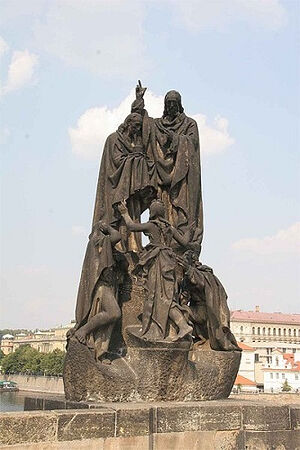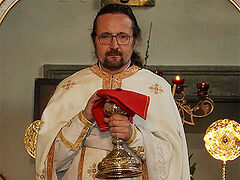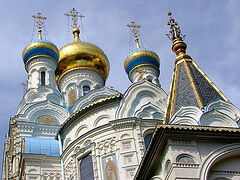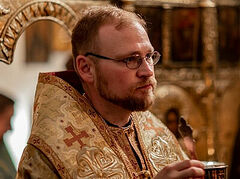Part 1: “Orthodoxy is About Community”
Fr. Vaclav serves in the famous Cathedral of Sts. Cyril and Methodius in Prague, helping its rector. He converted to the faith through his passion for archeology, became the first foreign priest in the history of Cyprus, and over the years of his ministry he concluded that only good should be seen in every human being. In Part 2, Fr. Vaclav talks more about atheism in Czech society; the “prison” of rationalism; why for Czechs the beer house has replaced church; and the recipe for preserving the faith in our world full of temptations.
—As far as we know, the Czech Republic has a very high percentage of atheists. Why? And what about the religiosity of the population in neighboring Slovakia?
—Atheism here is also a consequence of a number of historical events. The Hussite Wars undermined public confidence in the Roman Catholic Church. Later the Catholic Church was seen as an instrument of Government and Germanization by Austria-Hungary. The religious orientation of the First Republic after 1918 further increased distrust of the Catholic Church. In the end, everything was completed by the Communists: with their negative attacks and reminders of a number of historical events instilled in the population not just distrust but hatred of Christianity. In Slovakia, as in Poland, the situation was different because the Catholic Church became a kind of national Church. In Bohemia and Moravia this almost never happened. Because of the strong rationalistic currents and especially because of the individualistic way of life with all the negative things that it brings, the phenomenon of Czech atheism arose.
—Were there cases in your pastoral practice when atheists actually became zealous Christians?
—Yes, there are many such cases. This is due to the fact that the majority of local atheists are fanatically rational people who are so caught up in the trap of their own rationalism that it becomes a “prison” for them.
A story comes to my mind. One man was an absolute pragmatist: Everything in his life was planned out, and he prospered. But once he suddenly found himself in a difficult situation: he ran out of money, his wife left him, and he became seriously ill. He couldn’t rationally explain how those negative things had happened to him because he had kept everything under control and thought out every step carefully. He wanted to commit suicide, but he heard the voice of Christ in his heart, came to believe in God and began to go to church.
—How many dioceses and ruling hierarchs are there in the Church of the Czech Lands and Slovakia today? How many parishes and monasteries do you have? And, most importantly, how many parishioners and believers in the Czech Republic and Slovakia call themselves Orthodox Christians?
—The Czech Church is headed by Metropolitan Rastislav (Gont), whose see is located in Presov. Slovak Presov and Czech Prague alternate as the see of the Primate of the Church of the Czech Lands and Slovakia, depending on who the Primate is. In Slovakia there are the Dioceses of Presov and of Michalovce and Košice; Moravia has the Diocese of Olomouc and Brno; the Czech Republic has the Diocese of Prague.
There are four dioceses in total. In the Czech Republic there are monasteries for men in Tesov and Hořovicki and a convent in Vilemov in Moravia. Monastic life in Slovakia is not developed, although many Slovak monks live in Greek monasteries. The problem with a small number of monasteries is a serious obstacle to the development of spiritual life in our lands, and it hasn’t yet been resolved.
There are about fifty parishes in the Prague Diocese, about thirty in the Olomouc Region, about 100 in the Prešov Region and about forty in the Diocese of Michalovce and Košice. The Holy Synod consists of six member bishops. Now the Orthodox Church in Slovakia has about 50,000 believers, and in Bohemia and Moravia there are about 40,000 faithful.
—In your opinion, what are the most acute problems for the Czech Church today?
—Firstly, the economic problem. In a few years the Orthodox Church will stop receiving economic support from the State, so the money received by the Church as restitution will run out. Clergy will need to learn how to raise money through sponsors, grants, and other sources. Believers should learn to be economically responsible for churches and for community management.
While everyone relied on the State, a negative trend emerged: Priests were not interested in exploring various forms of fundraising. On the other hand, the loss of financial support can lead to moral prosperity, because people who perceive their mission in terms of financial gain will leave the Church.
Secondly, it turned out that the publication of Orthodox literature and intellectual missionary activity in themselves cannot consolidate people’s interest in Orthodoxy. However, the publication of spiritual literature, books about spiritual elders, for example, remains an important aspect of preaching. People should actively participate in prayer, in spiritual life. First of all, one should understand the essence of what a church community is and isn’t. The spirit of individualism and pragmatism isn’t helpful. In order to be a good Orthodox Christian one must learn to live in society, in a family, he must learn tolerance.
Without the development of basic human qualities it is difficult to become Orthodox. People don’t know how to pray or why they should pray, and this is very hard to learn.
Thirdly, mass migration from Transcarpathia has led to the situation that now churches are filled with Orthodox Christians. However, this has brought the illusion that this situation will continue in the future. Many non-missionary priests from Transcarpathia are also coming with believers. As I have already stated above, our Church is missionary. This means that believers from abroad must show some sensitivity to the development of the Local Church. It is necessary to understand that one must fight with a special effort for the soul of every atheist. Because in the situation that we have now the next generation of emigrants also risks growing up in an atheistic environment. At present, the Church is in danger of “resting on its laurels”, as it were, unless it takes advantage of the favorable situation of increasing the number of believers to strengthen the position of Orthodoxy among local residents.
Fourthly, the issue of the development of education. Theological and spiritual education is at a low level. This has to do with endless disputes about what Orthodoxy is and what it is not. Therefore, it is necessary to develop catechization and religious education. Alas, so far believers have displayed little interest in self-education. Such an attitude on their part leads to unnecessary and meaningless disputes about the essence of the Orthodox faith. An educated person stands above these controversies and understands matters of faith more objectively.
 The monument to Sts. Cyril and Methodius in Prague —Now let's move on to the church in which you serve. In addition to the fact that it is the cathedral for Prague, a well-known story from World War II is connected with it.
The monument to Sts. Cyril and Methodius in Prague —Now let's move on to the church in which you serve. In addition to the fact that it is the cathedral for Prague, a well-known story from World War II is connected with it.
—This church was originally Roman Catholic. The Orthodox Church received it from the municipality in 1933. During the Protectorate (during WWII), when German troops controlled Bohemia and Moravia, a sabotage group was sent from Britain to remove Reinhardt Heydrich, a notorious politician of the Third Reich. After a successful assassination (1942), the saboteurs sought refuge, and since locals refused to give them refuge, Orthodox priests hid those British subjects in the church crypt. However, the Germans found out where their hiding place was from a military traitor and, after the siege of the church, killed all the saboteurs. Orthodox priests, including Bishop Gorazd, who had helped the British subjects, were executed. Subsequently, Orthodox Church activity was banned by the Germans. Bishop Gorazd and the priests associated with him were later canonized.
—How does your community live today? How big is it? How is life organized in your parish and in the Czech Church in general? How active are the laity, including in sharing responsibility for the life of the community?
—The story associated with the saboteurs attracts many people to the church—this is a fact. In addition, the large number of emigrants and the location of the cathedral in the center of Prague means that many people are coming to us. However, this is a problem because the church resembles a railway station where people come and go. As a priest I am faced with the problem of lack of continuity and conciliarity. People haven’t learned to live in community—they come to pray and leave. It is very difficult to organize joint events, even such as a common meal. In this sense, people from Russia and Ukraine have already come to realize that everyone should contribute something to the life of the parish. But such qualities as belonging and participation are only just developing among the Orthodox in our country. Besides, various programs that we organize, such as showing films or giving lectures, must be constantly changed and transformed in the spirit of the time in order to remain relevant to people. For local Czechs the Church has become a symbol of resistance, but a church is not a museum. We must develop the tradition of the New Martyrs by an example of living faith.
In the cathedral we try to hold as many services as possible and focus on prayer life. I emphasize all the time that services should be celebrated frequently, even when the attendance is low.
—You managed to serve both in the Czech Republic and in Slovakia. The once united country has turned into two neighboring states. Is Church life in the two countries very different today?
—Despite the geographic proximity, differences between the two countries are great. The mentality is different. Slovaks have rich folklore, their family traditions are stronger than in the Czech Republic, and there is more harmony in moral values. In the Czech lands the importance of family values has somewhat decreased. Czechs like to gather in beer houses, and the beer hall is like a “church” for them. But both countries have something interesting to offer. I enjoyed serving in Slovakia, but I also see a lot of interesting things here in the Czech Republic.
—How are relations between the Church and the State developing in these countries? And how is the dialogue with representatives of other denominations and religions organized?
—Despite the atheistic tendencies, we can say that in the Czech lands the State authorities act correctly in relation to the Church and, paradoxically, better than in Slovakia where the level of religiosity is higher. In Slovakia, the Roman Catholic Church is obviously a kind of national church, as in Poland. But the trouble is that municipalities often have problems when it comes to building new churches. Dialogue with other faiths has an official character. Islam, Buddhism and other non-traditional religions for the region aren’t strongly represented here, but there are fears in society regarding radical Islam because there are negative examples of terrorism in Western Europe. And this has a negative effect on Orthodoxy, since atheists are often looking for any excuse to condemn all religions in one way or another.
—What is your recipe for the disease of “loss of faith” by Christians in our difficult world full of temptations?
—We should focus on how to become free internally and find joy in everyday life, despite any problems, and also show attention to our neighbors. A true servant of God doesn’t see problems: he sees only beauty and goodness. He needs to see only good around him and only good in every human being. If he lives like this, he is happy, and faith comes by itself.
—What are the most popular questions that believers ask you as a priest? What are the most frequent problems that your parishioners have to face?
—I often encounter problems in marriages. I am also very worried about the increase in the number of mental disorders, because people are coming to me with these issues. In my opinion, society is becoming more and more ill from the psychological point of view, and it is looking for a cure in Orthodoxy. I am also fighting the limitless use of mobile phones, tablets and computers. Parents destroy their children by allowing them to use these devices uncontrolled. Unfortunately, today’s parents are so stupid that they simply don’t see the detrimental effect of modern technology on the development of imagination and personal freedom in children.
—Tell us about the most venerated local saints in the Czech Republic and Slovakia.
—The most popular saints are Sts. Wenceslas (Vyacheslav) and Ludmila, holy Equal-to-the-Apostles Cyril and Methodius, Procopius of Sazava, John (Ivan) the Czech (also known as “John the Hermit”), Rastislav, the New Martyrs Gorazd and those with him. St. Wenceslas (the tenth century) was slain by his brother at the church door and mainly symbolizes Bohemia as such, since he was a gentle ruler and tried to get along with his neighbors. St. Ludmila is popular among the Eastern Slavs and is associated with the defense of the faith. She was St. Wenceslas’ grandmother and symbolizes maternal feelings and Christian upbringing.
—And now can you list the must-visit places in the Czech Republic and Slovakia for pilgrims from Russia?
—These are places associated with the Mission of Sts. Cyril and Methodius, such as Mikulčice, Velehrad, Sazava Monastery, Budec, Prague and its rotunda churches. Recently, rotundas of the ancient period have been discovered in Slovakia, for example in Kopčany. Also, Nitra in Slovakia. In fact, in cities such as Prague, Brno, Bratislava and Presov there are many monuments directly or indirectly related to Eastern Christianity. In Karlovy Vary and other spa towns there are Orthodox churches built during the time of the Russian Empire. It will be very interesting to visit them.
—What is the main lesson you learned over the years of your priestly ministry?
—To see only good in every human being!
—Thank you for this wonderful interview! In conclusion, our traditional question: what words from the Holy Scriptures especially inspired you and supported you in difficult moments of life?
—Physician, heal thyself (Lk. 4:23).







